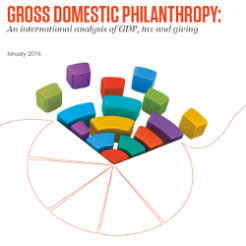An international giving analysis has found no correlation between levels of taxation and government spending and the amount individuals give to charity, according to a report published by Charities Aid Foundation.
The report, called Gross Domestic Philanthropy: An international analysis of GDP, tax and giving published by CAF today, analyses the charitable giving of people in 24 countries as a percentage of those countries' overall gross domestic product.
The report shows individuals in the United Kingdom give, on average, about 0.54 per cent of overall GDP. This saw the UK come in fourth overall behind Canada, New Zealand and the United States of America, which topped the index. The UK was also the highest ranked of the European countries analysed.
The 24 countries that CAF has obtained information from account for approximately 75 per cent of global GDP and 53 per cent of the world population.
The report showed that issues like overall tax burden, top tax rate, average income tax, corporation tax, government expenditure as a percentage of GDP and employer social security charges all had no direct effect on the amount that an individual gives to charity. The only metric that seemed to show any correlation to this was what the report calls “employer social security changes”.
The study is a follow up to a similar analysis CAF undertook in 2006. The paper, called International comparisons of charitable giving, ranked countries by how generous they were as a proportion of GDP. The 2006 paper analysed data from only 12 countries.
While CAF have said that “technological advances” have made the process of gathering the information easier, it concedes that “there is still a lack of truly comparable data at an international level” and that many challenges still remain.
To address these problems going forward, CAF recommends that countries, where possible, “collect standardised data, increase the availability of data online” and “publish in a single language globally to assist with international dissemination”.
Adam Pickering, international policy manager at CAF, said:
“Across the 24 nations we studied, we found no significant link between government spending, income or corporation tax and the proportion of GDP donated by individuals.
“This suggests the relationship between the amount of taxes people pay and the amount they give to charity is not as clear-cut as some may have thought. The factors which motivate people to give, and influence how much they give, are incredibly complex.
“The lack of standardised reporting on charitable giving makes it difficult to arrive at definitive conclusions. But we hope this analysis leads to further, more informed discussions about the impact economic factors like tax and overall GDP have on charitable giving.”









